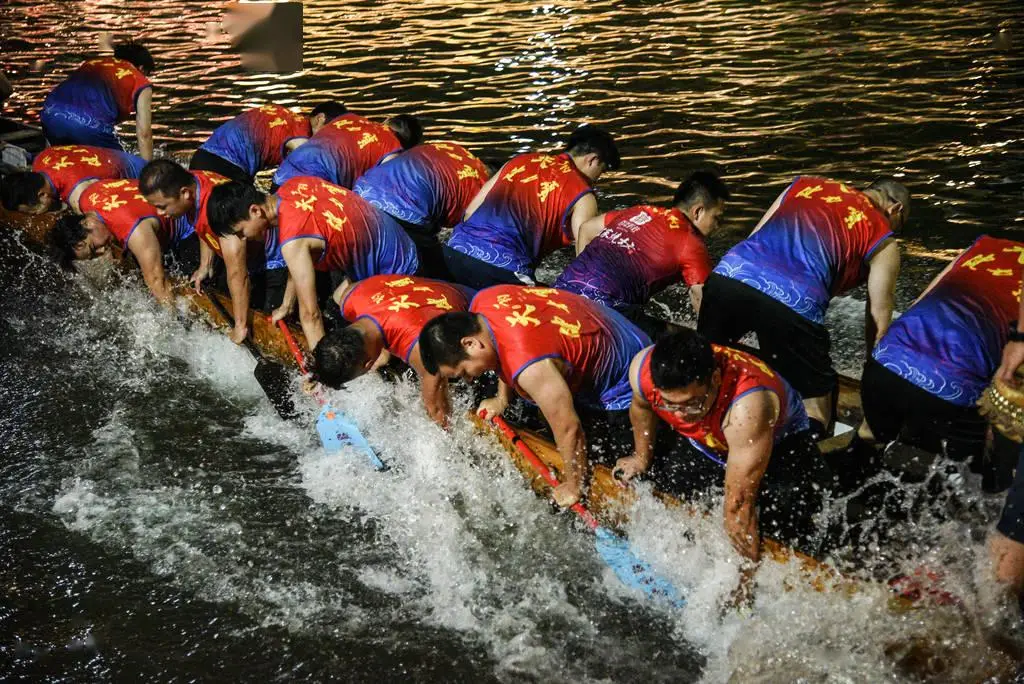Guangdong Dragon Boat Racing
Guangdong dragon boat racing is one of the most representative traditional folk activities in the Lingnan region, especially prevalent in the Pearl River Delta, Chaoshan Plain and other areas with dense water networks. As a core custom of the Dragon Boat Festival, Guangdong dragon boat racing has maintained its traditional essence while forming unique local ceremonial procedures and competitive formats, demonstrating the collective spirit and cultural vitality unique to Lingnan water towns.
Historical Origins of Guangdong Dragon Boats
The history of Guangdong dragon boat racing can be traced back to the Warring States period, originally related to the legend of commemorating Qu Yuan, and took root in the Lingnan region as Central Plains culture spread southward. According to historical records, as early as the Southern Dynasties period, dragon boat races were already held in Guangzhou during the Dragon Boat Festival, and by the Ming and Qing dynasties, the practice had matured, forming complete rituals and rules.
The dense river networks in the Lingnan region provided natural conditions for dragon boat activities, while the pragmatic, enterprising, and collaborative spirit of the Lingnan people transformed dragon boat racing from a simple commemorative activity into a comprehensive folk event with competitive, entertaining, and community cohesion functions.
"On the fifth day of the fifth month, dragon boat drums sound."
—— Guangdong folk proverb vividly describing the lively scene of dragon boat races during the Dragon Boat Festival
Unique Features of Guangdong Dragon Boats
Compared with other regions, Guangdong dragon boats have distinctive characteristics in their design and decorative styles:
Vessel Characteristics
- Length: Typically 20-30 meters, accommodating 30-50 paddlers
- Structure: Overall dragon-shaped design, divided into dragon head, dragon body, and dragon tail
- Material: Traditionally made of kempas wood, now mostly using lightweight materials
- Seating: Symmetrically arranged on both sides, with a drummer in the center directing the rhythm
Decorative Features
- Dragon Head: Majestic in shape, vibrant in color, with unique designs for different villages
- Dragon Body: Covered with scale patterns, beautifully painted, mostly in bright colors like red, yellow, and green
- Dragon Tail: Upward-curving design, echoing the dragon head, maintaining the boat's balance
- Banners: Colorful flags inserted at the bow, indicating the village or clan affiliation
Complete Process of Guangdong Dragon Boat Racing
Guangdong dragon boat racing is not just a simple boat race, but a cultural activity that includes a series of traditional rituals, with the complete process usually lasting several weeks:
Dragon Boat Awakening Ceremony
In the fourth lunar month each year, the dragon boats buried the previous year are dug out, cleaned, repaired, and blessed by worshipping the gods

Training Preparation
Young men from the entire village participate in training to develop team synergy, endurance, and speed
Official Competition
Held on the Dragon Boat Festival, including dragon worship, eye-dotting ceremony, race, and awards ceremony
Among these, the "Dragon Boat Eye-dotting Ceremony" is one of the most ceremonial aspects, where a respected elder or guest from the village uses cinnabar to dot the dragon's eyes, symbolizing the bestowal of life and spirit to the dragon boat. During the race, the drummer beats different rhythms according to the race progress and pace changes, directing the paddlers' unified movements, while spectators onshore cheer loudly, creating a lively atmosphere.
Regional Dragon Boat Characteristics in Guangdong
Guangdong is a vast region, and dragon boat activities in different areas have their own characteristics:
| Region | Representative Locations | Distinctive Features |
|---|---|---|
| Guangzhou | Liede, Chebei, Pantang | Emphasizes clan heritage, dragon boat visiting customs are prevalent |
| Foshan | Diejiao | Unique "curve racing" that tests control skills |
| Dongguan | Machong, Shatian | Large dragon boats, well-organized competitions, strong competitive nature |
| Zhongshan | Xiaolan, Guzhen | Combines water town characteristics, dragon boats deeply integrated with local folk customs |
| Chaoshan Region | Shantou, Chaozhou | Elaborate and grand ceremonies, closely related to Chaoshan clan culture |
Social Significance of Dragon Boat Culture
In Guangdong society, dragon boat racing has long transcended being just a festival activity and has multiple social and cultural meanings:
- Community Cohesion: Dragon boat activities are often organized by villages or clans, enhancing collective identity
- Cultural Heritage: Transmits values such as teamwork, striving for excellence, and respect for tradition
- Social Networks: Maintains and expands local social networks through dragon boat visits
- Cultural Identity: Has become an important symbol of Lingnan culture, enhancing local cultural confidence
- Economic Impact: Drives tourism development, forming a characteristic cultural industry
Innovation and Development of Modern Guangdong Dragon Boats
Contemporary Guangdong dragon boat racing continues to innovate and develop while adhering to tradition:
Local governments and civil organizations actively hold dragon boat cultural festivals, such as the Guangzhou International Dragon Boat Invitational Race and Dongguan Dragon Boat Championship, combining traditional folk customs with modern sports events. Meanwhile, the emergence of women's dragon boat teams has broken the traditional convention that dragon boats were only participated in by men, demonstrating the contemporary concept of gender equality.
Guangdong dragon boats also often serve as cultural exchange envoys, participating in international dragon boat competitions and showcasing the charm of traditional Lingnan culture to the world. In recent years, with the advancement of intangible cultural heritage protection work, dragon boat customs in multiple areas of Guangdong have been included in intangible cultural heritage lists at various levels, receiving better protection and inheritance.